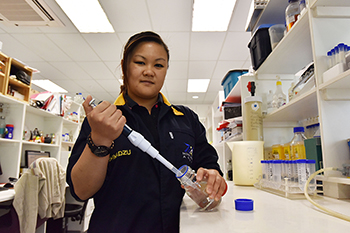Latest News Archive
Please select Category, Year, and then Month to display items
![]()
The Faculty of the Humanities Centre for Gender and Africa Affairs, in collaboration with the Department of Science and Innovation, Academy of Science of South Africa, and the Edith Cowan University, will be hosting a Visiting Scholar Lecture with Prof Loretta Baldassar titled: Transnational Family Care: from social death to digital kinning over a century of Australian Migration.
Staff and students are encouraged to attend. The details are as follows:
Date: 18 March 2023
Venue: Council Chambers, George du Toit Building
Time: 15:00
 Click here for more information.
Click here for more information.
Please contact Portia Gailele at gailelepb@ufs.ac.za to RSVP to this event.
The impact of personal care products on water resources in the Free State
2015-12-14

Jou-an Chen
Photo: Charl Devenish
|
Water is of the utmost importance in personal hygiene. Most people can hardly have a day go by without taking a shower in the morning and at night. However, it is this very habit that is increasingly polluting the water resources in South Africa.
Contaminants found in pharmaceutical and personal care products have been accumulating in water masses in recent years. These contaminants especially refer to hormones in medication, as well as colouring agents and fragrances used in soap, shampoo and body lotions.
“Little information and data are available on the prevalence of these contaminants, and on how high the level of pollution really is,” says Jou-an Chen, researcher in the Department of Microbial, Biochemical and Food Biotechnology at the UFS.
Her research particularly focuses on the prevalence and impact of those contaminants.
“Because these substances have not been properly investigated, we are not sure how widely it occurs and whether it is harmful to the environment. It was precisely the lack of information that has inspired me to investigate further.”
“If we could identify the contaminants and what it is doing to the environment, it could make a valuable contribution to directives on water quality standards.”